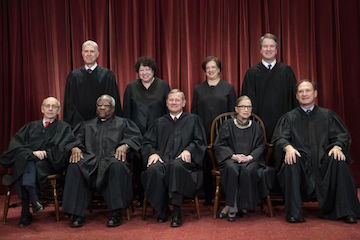Wine and the Courts: Key 2018 Wine Trend #3
 Among the more notable things about this third of three Key Wine Trends For 2018 that I’ve identified is that, unlike the first two, it does not track with broader cultural themes we witnessed this year. The issues of Gender & Wine and Cannabis & Wine are both downstream impacts of important movements within the American culture. The issue of The Courts and Wine is, instead, a description of a movement indicative of the unique classification of alcohol in American commerce and politics.
Among the more notable things about this third of three Key Wine Trends For 2018 that I’ve identified is that, unlike the first two, it does not track with broader cultural themes we witnessed this year. The issues of Gender & Wine and Cannabis & Wine are both downstream impacts of important movements within the American culture. The issue of The Courts and Wine is, instead, a description of a movement indicative of the unique classification of alcohol in American commerce and politics.
The most consequential piece of wine litigation in 2018 has been Blair v. Tennessee Wine Retailers, a case that has been accepted to be heard before the Supreme Court of the United States. At the heart of this case is the question, to what degree do protections against state discrimination apply to alcohol retailers? The Court has already determined that protections against state-based discrimination apply to producers and products. That decision, relying upon the dormant commerce clause, was decided with Granholm v Heald in 2005. Over the next 13 years, various courts have taken different positions on whether wine retailers are protected in the same way.
What’s at stake in the Blair case is not merely the immediate question of whether durational residency requirements violate the Commerce Clause, but also whether the many discriminatory and state-based bans on interstate retailer wine shipping also violate the Constitution’s Commerce Clause. The interest in this case and testimony to the stakes involved can be discerned from the 22 amici briefs that have been filed in support of the appellant (Tennessee Wine & Spirit Retailers Association) and the respondent (Total Wine & More).
The importance of this case is also seen in the fact that the outcome of numerous other current lawsuits will largely depend on the ruling of the Court in Blair (likely sometime around May or June 2019). Two wine retailer shipping cases, one in Michigan and one in Illinois, are essentially on hold until the court decides Blair. In addition, Walmart’s challenge of a Texas law that prevents corporate ownership of retail outlets also hinges in part on the Blair case.
It’s important to appreciate the bottom line in both the Blair case and the cases that await its conclusion. For decades the grant of power to the states by the 21st Amendment to regulate alcohol within their borders has been used in great part to support discriminatory laws that seek primarily to protect local special interests from competition. Though bans on direct shipping, restrictions on who may own retail outlets, restrictions on what kind of retailers may sell what kind of alcohol, and an embrace for the state-mandated three-tier system have all been supported by dishonest and self-serving appeals to safety, in fact, these laws are primarily efforts to reward the special interests who benefit from the protectionist laws and deliver political contributions to ensure those benefits.
If the Court rules that the protections against discrimination promised by the Commerce Clause do indeed apply to retailers, it will go a long way toward bringing down a number of state laws that merely serve the largest campaign contributors. If, on the other hand, the Court veers off course and provides constitutional justification for protectionist state legislation, consumers and entrepreneurs will be mightily harmed.
In 2018 three important courts, a Michigan Federal District Court, the Sixth Circuit Court of Appeal and the Seventh Circuit Court of Appeals, all provided rulings that offer optimism to those of us who believe competition, liberal access to markets, free markets, and consumer rights provide the most reasonable path forward for the regulation of alcohol. The trajectory is positive.
I started this post by noting that unlike the first two entries in this three-part series on Key Trends in the Wine Industry in 2018, this issue of the Courts and Wine doesn’t track with prominent cultural trends. That’s not entirely true. It was the acceleration of the trend toward online commerce that led to the Supreme Court’s Wayfair decision this year. That decision changed the way internet commerce is taxed. Many of the questions revolving around the Blair case have been driven by the impact of interstate shipment of wine, which in turn has been driven by the continued growth of Internet sales and information dissemination.

Your article gave me a lot of inspiration, I hope you can explain your point of view in more detail, because I have some doubts, thank you.